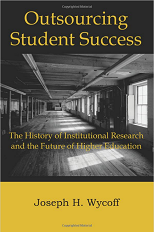Book Review: Is Outsourcing Student Success the Future of Higher Education?
Joseph H. Wycoff, Ph.D.
 “To make wise decisions,” A. J. Brumbaugh wrote on behalf of the American Council on Education (ACE) in 1960, “data that only institutional research can provide are indispensable.”
“To make wise decisions,” A. J. Brumbaugh wrote on behalf of the American Council on Education (ACE) in 1960, “data that only institutional research can provide are indispensable.”
Nearly sixty years later, access to institutional data has become more integral to college executives but the new priority for wise decision-making is to translate data into intelligence for strategic planning and institutional effectiveness. With a shift in emphasis, traditional institutional research offices have struggled to keep pace with the demands for improvement to college students’ outcomes. Following a 2014 study of the states’ public systems, the National Association of System Heads (NASH) concluded, “The overall ability of IR offices to use data to look at issues affecting many of the cross-cutting issues of the day—such as the connections between resource use and student success—is nascent at best.”[i]
To move forward, many institutions now partner with third-party vendors of data science for student success such as Civitas Learning, Hobsons PAR Framework, Education Advisory Board, or IBM Watson Engagement Advisor. Given the costs for new technologies and analytics, effective management of these partnerships for the mission-critical goal of student success will be paramount to strategic leadership and the execution of action plans in college administration.
Interim presidents and provosts experience these recent trends more acutely. In the private non-profit sector, institutional research offices often have more limited resources and capacities than the public sector. At times, unreliable or inaccurate data may contribute to or exacerbate an institutional crisis that leads to the need for an outside interim appointment. For the institutions where administrative leaders have access to reliable data, few institutional research offices have the capabilities to scale with the demand for predictive analytics and student success that trustees and accreditors now expect as the norm.
In my new book on the field of institutional research, Outsourcing Student Success, I examine the one-hundred-year history of the profession in the context of recent trends to outsource predictive analytics and student success solutions to third-party vendors. Since its inception in the early twentieth century, the field of institutional research endeavored to advance modern management techniques, data analytics, and knowledge about what works for college student success. The profession’s struggle to fulfill the promise reflected in Brumbaugh’s endorsement above serves as a cautionary tale for those carrying forward the mantle of higher education reform based on predictive analytics of student success.
As the ACE recently wrote in its guide for the data-enabled executive, “Like it or not, colleges and universities are facing considerable threats to their continued existence, and the pressure to use data will only grow from this point on. Leaders will need to be well versed in the opportunities and challenges of leveraging data in order to better inform business models centered on student outcomes, equity and inclusion, and optimization.”[ii]
An historical perspective of institutional research is essential for interim positions that leverage data for both students success and college affordability. Registry interim presidents, provosts, and others will use this perspective to identify when it is feasible to develop information infrastructure internally, and when to partner with external solution providers. Understanding how traditional institutional research and modern predictive analytics fit together, interim presidents and senior administrators will make the most of their opportunities to launch and steer colleges and universities along their analytics journey. [ACE].
[i] National Association of System Heads (NASH), “Meeting Demand for Improvements in Public System Institutional Research: Assessing and Improving the Institutional Research [IR] Function in Public University Systems,” February 2015, http://nashonline.org/wp-content/uploads/2017/08/Assessing-and-Improving-the-IR-Function-in-Public-University-Systems.pdf. Accessed on October 13, 2017. [ii] Jonathan S. Gagliardi and Jonathan M. Turk, “The Data-Enabled Executive: Using Analytics for Student Success and Sustainability,” American Council on Education, December 2017, http://www.acenet.edu/news-room/Documents/The-Data-Enabled-Executive.pdf. Accessed on February 9, 2018.
Outsourcing Student Success: The History of Institutional Research and the Future of Higher Education is available from Amazon.com, bookstores, and other online retailers.
HIRE AN INTERIM
Searching for an Interim?
Please contact us for more information.

